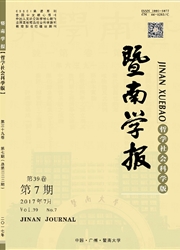

 中文摘要:
中文摘要:
俗语辞书是记录并诠释较通行的一般性的汉语方言俗语的辞书。明清俗语辞书中收录了较多的佛典词语,说明相当多的佛典词语已经完全融入全民口语,成为当时"俗语"的一部分;也说明辞书编纂者对佛典词语有比较清楚的认识。明清俗语辞书收录的佛典词语的释词特点有二:一是释义简单,或无释义,且以书证为主,体现辞书编纂中的"原则中心论";二是释义注重外来词的形式与意义的综合考察。明清俗语辞书中收录的佛典词语在词目及释义、书证等方面可供当代语文辞书编纂借鉴;在汉语词汇学研究的多个方面(例如异形词研究)也具有参考价值。
 英文摘要:
英文摘要:
The slang dictionaries are the dictionaries which recorded and explained the current and general words of Chinese dialects and slangs.There were many Buddhist words in the slang dictionaries in Ming and Qing Dynasties,which indicated that many Buddhist words had integrated into the national spoken language and became parts of the slang words;and indicated that the slang dictionaries writers had clearly understanding of the Buddhist words.There were two characteristics of explaining Buddhist words in Ming and Qing Dynasties,the first was that the explanation were simple and sometimes no explanation,but the documentary evidences were obvious,which reflected the principle centered theory of compiling dictionaries,the second was that the form and meanings of Buddhist loan words had been comprehensive surveyed.The lemmas,explanation and documentary evidences of Buddhist words in slang dictionariesin Ming and Qing Dynasties had much references value in the contemporary Chinese Dictionaries,and had reference value in the Chinese Lexicology study,such as profiled words study.
 同期刊论文项目
同期刊论文项目
 同项目期刊论文
同项目期刊论文
 期刊信息
期刊信息
